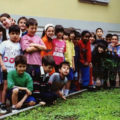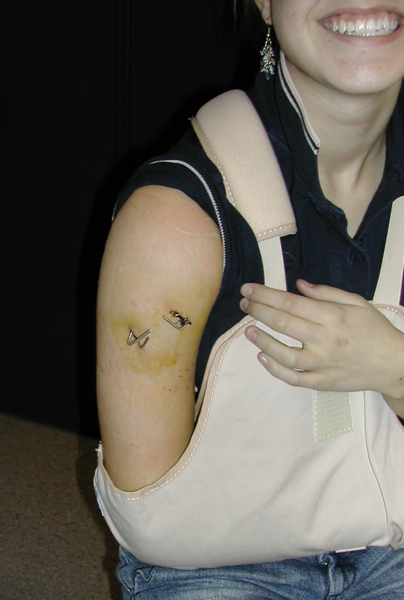In America, high school is hell. The movie The Breakfast Club (1985) used sharply-delineated characters to illustrate the social divisions that exist in many/most schools: the jock, the prom princess, the stoner, the brain, the geek. It’s a caste system, where positions are won by looks, money, or athletic ability, and the hierarchy is maintained by ostracism, teasing, and violence.
Columbine focused attention on the extreme results: the outcast loners who exacted bloody revenge. Steps have been taken to prevent recurrence; weapons searches have been instituted (in many schools, simply increased), conflict-resolution courses and post-trauma counseling are offered. Yet bad stuff continues to happen, some of it perpetrated by the top dogs on the underdogs, some of it by underdogs using weapons to shift the balance of power. The underlying problem has not changed: there are still top dogs and underdogs.
One solution being tried is separation: if you can’t survive in a normal high school, go somewhere else. The Harvey Milk School in New York city was created for gay students who were mercilessly bullied in other schools.
The New York Times (“School Away From School,” Dec 7, 2003) now reports on virtual high schools, where kids can do high school coursework at long distance, with testing, grading, and teacher support provided online. Some of the virtual school students interviewed had suffered in the high school social system, others feared what they themselves might become under social pressure. Some are simply too smart, and several grades ahead of their age group (a proven recipe for social disaster), others suffer various degrees of distraction/ADD, and find they can concentrate better at home.
Homeschooling (where the parents do the teaching themselves) is also common in the US. For some families, this is a religious choice; for some, it’s about quality (or special needs); for many, it’s probably both.
You have to wonder what the kids are missing in all of these non-standard school experiences. A fair amount of misery, to be sure. But what happens after high school, when they suddenly have to deal with all sorts of people? (Yes, I know that many homeschooling parents go to great effort to ensure that homeschooling does not cut their kids off from the usual kid experiences and contacts; I also know some whose main reason for homeschooling is to keep the kids away from “bad influences.”)
There’s got to be a better way for adolescents to get an education. I don’t have definitive answers, but I’ve been thinking hard about examples I’m familiar with from other parts of the world.
At Woodstock, tolerance was and is the norm, and violence is rare. In my four years of high school, I only heard about one incident in which a guy even tried to hit somebody. (He missed, and smashed his hand into the wall.) Severe bullying and teasing were fairly uncommon in my day, and as far as I know still are.
There are plenty of differences among Woodstock students – nationality, race, religion, wealth, background, you name it. But there’s no caste system. There are jocks, brains, prom queens, and stoners – and they’re often the same people. Maybe this is because the school is so small that we all had to fill multiple roles. My roommate was a basketball player and a cheerleader, played in band and orchestra, and worked on the yearbook. I was a journalist and public works artist, worked on the yearbook, wrote a student handbook (my first manual/user guide), and was president of the dorm. Another classmate was student body president, on several sports teams, and was a yearbook photographer. Of course we all had plenty of schoolwork to do as well. Maybe we just didn’t have time for the rubbish that goes on in American schools.
The rigid social divisions of American high schools don’t seem to exist in Italy, either. Ross tells me that there are some cooler kids, though in her current class she can’t tell me who they are or what makes them cool. Her middle-school class had an alpha male, so-considered partly because of his trendy clothing. Her current class has some kids who don’t interact much; she is studying the problem, trying to figure out how to involve them more in the social life of the class. In any case, they don’t seem to be particularly bullied or teased.
Maybe the American emphasis on competitive sports is part of the problem. Italian schools don’t do sports in the same way. They have physical education classes, and Ross’ current high school has after-school basketball, but it doesn’t seem to be a big deal. Lecco is an athletic town, and many kids do competitive sports, but elsewhere, either as individuals or with teams that are not related to the schools. So athletic ability is not particularly noticed in school.
Woodstock has plenty of sports, but, in my day, being an athlete didn’t carry more cachet than any other accomplishment. I don’t recall anybody swooning over a guy because he was captain of this or that team. Good sportsmanship was considered more important than winning (though winning was also fun).
Perhaps Woodstock and Italian schools have less strife for very different reasons. In Woodstock’s case, it’s partly due to the extreme variety among the students: there are so many differences that no single group can easily rule the roost.
What works in Italy may be homogeneity: everyone in a given school is very similar to everyone else in background and experience, and any differences are smoothed down, de-emphasized. There are no accelerated classes for extra-smart kids, and those with disabilities (physical or learning) are, as far as possible, mainstreamed into regular classes, with extra teaching support provided right there. This also applies to recent immigrants, who generally attend regular schools and lessons, with some extra help for Italian language.
So what goes wrong in American schools? I’m groping here, but maybe the problem is an intolerant heterogeneity. America is still a melting pot, but American culture demands that people fit in, and take on the same values as some fictive majority. Kids are especially conservative, and not inherently politically correct, so this is played out more overtly in school than later in life. Now there’s a scary thought: is American high school simply a microcosm of what’s going on, clandestinely, in American culture at large?
Note (Oct 7, 2010): Sadly, there have been cases of bullying at Woodstock in more recent years. And it’s all gotten much worse in the US.







